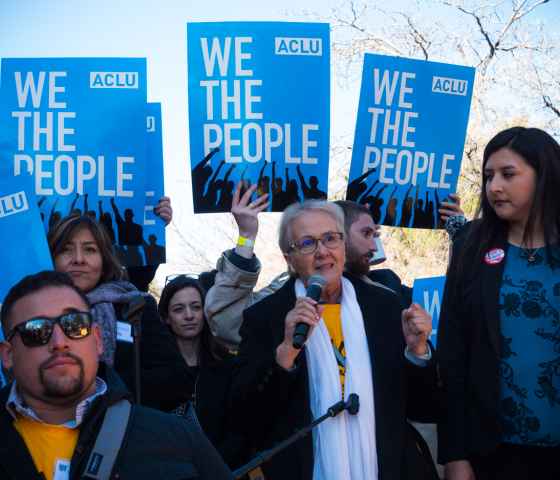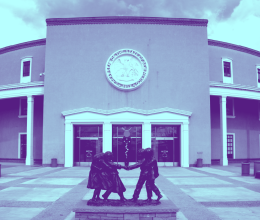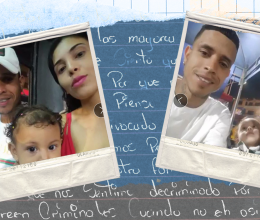"The agents didn’t say anything about where they were going to take my son,” said Samuel*, from behind a glass partition. “They just took him away. And then they told me I was going to jail. I’ve never been to jail. This has never happened before.”
Three fathers, Samuel, Javier, and Mauricio, sat across from us choking back tears as they told us how the agents took their children. With tired and wet eyes, they told us how much they missed their children. How no one from the government would tell them when they would see their children again or why they took them away. In June when Nia Rucker, ACLU-NM Policy Counsel and Regional Manager, and I visited the Otero County Processing Center, a private ICE detention facility in southern New Mexico where these fathers are being held, they had not seen their children in weeks.
Samuel last saw his six-year-old son in a hielera — a temporary holding cell so cold that they are known as “iceboxes” in Spanish. He wept as he recalled lying on the cold, concrete floor with his son. Border Patrol agents came in and made the children line up against a wall opposite from the parents and then took them away. Powerless to stop them, all Samuel could do was hold his son in his gaze until he disappeared out of sight.
Samuel knew his son was detained somewhere in a children’s shelter. But when we met him, Samuel had only spoken with his young son twice, in part because he couldn’t afford the steep rates the for-profit prison charges for calls.
When the Border Patrol agents came for Javier’s sevenyear-old, he tried to spare his young son by telling him agents were taking him to play with other kids. In the weeks since he was taken away, Javier has only been allowed one call with his son—who he believes is somewhere in Phoenix.
For his part, Mauricio was struck by the coldness with which Border Patrol agents told him they were taking his 13-year-old son.
“You will go to a prison for zero to six months,” the agent gruffly told Mauricio. “The boy will go to a shelter.”
At the time we met, Mauricio had not spoken with his child and didn’t even know where he was.
We’ve met with more than a dozen parents detained in Otero, Cibola, and El Paso detention facilities over the last few weeks, gathering testimony to support the ACLU’s class action lawsuit challenging the Trump administration’s practice of forcibly separating asylum-seeking parents and their young children.
Every parent we spoke with was consumed with grief. They were exhausted from sleepless nights spent in detention, listening to the echo of clanging metal doors and worrying about their children. And they were devastated by their own powerlessness to help them.
As the mother of a young son myself, my heart breaks for these parents. No parent should ever have their children taken from them and kept in prison-like conditions. But this is what our government has done to thousands of immigrant parents. No child should ever experience the terror and trauma of being ripped from their parent’s arms and taken away by uniformed strangers. But because of the Trump administration’s unspeakably cruel immigration policies, thousands have been.
No child should ever experience the terror and trauma of being ripped from their parent’s arms and taken away by uniformed strangers. But because of the Trump administration’s unspeakably cruel immigration policies, thousands have been.
By now, you too have doubtless glimpsed fragments of this calamity from the leaked audio recordings of young children crying for their parents, photographs of kids sleeping in chain-linked cages, and news stories of families fleeing persecution only to be torn apart. These heartrending stories have humanized this issue and fueled public outrage, leading to widespread condemnation from all sides. Even in deeply divided times such as these, the vast majority of Americans agree that tearing a child away from their parent is wrong.
The ACLU has been on the frontlines in fighting this administration’s unconscionable family separation policy every step of the way, filing a lawsuit in February on behalf of a Congolese mother who was separated from her seven-year-old daughter when she arrived in the U.S. to seek asylum. As a result of this lawsuit, a federal district court judge ordered the administration on June 26th to stop separating families and to reunite detained parents with children younger than five within 14 days, and older than five within 30 days.
But the fight is far from over.
With court orders and widespread public outrage blocking Trump’s preferred policy of family separation, the Trump administration has pivoted to a scheme of mass family detention where children and their parents would be detained together. Make no mistake, any solution that puts nursing mothers and children behind barbed wire is not a humane alternative. In a recent executive order, Trump instructed the Department of Defense to provide “any existing facilities available” to house the thousands of migrant and refugee families he intends to detain. This opens up the possibility that New Mexico’s numerous military facilities could be used as detention camps for parents and small children.
The Trump administration filed an emergency motion seeking changes in a 1997 settlement known as the “Flores Agreement,” which established strict limits on how long and under what conditions the government can keep children in immigration detention. Fortunately, Federal District Court Judge Golly Dee blocked the motion, calling the move, “a cynical attempt... to shift responsibility to the judiciary for over 20 years of congressional inaction and ill-considered executive action that have led to the current stalemate.” T
The truth is, despite what the Trump administration may say, ending family separation doesn’t require mass family detention as an alternative. It is a false choice that we reject.
Although family separation and family detention have focused the nation’s attention on how cruel our immigration policies can be, these are only the most extreme and visible symptoms of an immigration system that is fundamentally at odds with the values and constitutional protections our nation claims to hold dear. Our country claims to be a place of refuge, but when people fleeing violence come to our door seeking shelter, we lock them away in for-profit prisons. Our country claims to offer constitutional protections to everyone, but denies basic due process to asylum seekers.
People detained on immigration charges and people seeking asylum often spend months, if not years, separated from their families while they wait for their cases to wind their way through the courts. The detention facilities that they are held in are often located in extremely isolated areas, hours away from the nearest immigration attorney. Consequently, many immigration detainees do not have access to counsel at all. Indeed, the U.S. government sees no problem with detainees as young as three-years-old representing themselves in their own immigration cases.
Sometimes problems like this can seem too big, too daunting for us as individuals to tackle. But we can’t let up. Here in New Mexico, we must hold our public officials accountable for the trauma and harm the Trump administration and private prisons are inflicting on immigrant families in our state. On July 16, our state legislators took an important first step by holding a hearing on how our state government can oversee private prisons that detain immigrants in New Mexico.
We’ve got a long way to go, but every step we take towards blocking inhumane immigration policies and dismantling the current system of injustice has an impact on people’s lives—people like Samuel who we met in detention. Samuel’s wife Elena called a couple of nights ago from Honduras.
“Samuel heard that he and our son are going to be reunited soon. Ojalá que sí,” said Elena.
We hope so too. The last time we saw him, Samuel said that when he and his son are reunited, he would send us a photograph of his son, and I promised that I would send him one of mine.
*All of the fathers’ names in this story have been changed to protect their identities.
This article originally appeard in the 2018 spring edition of The Torch.


